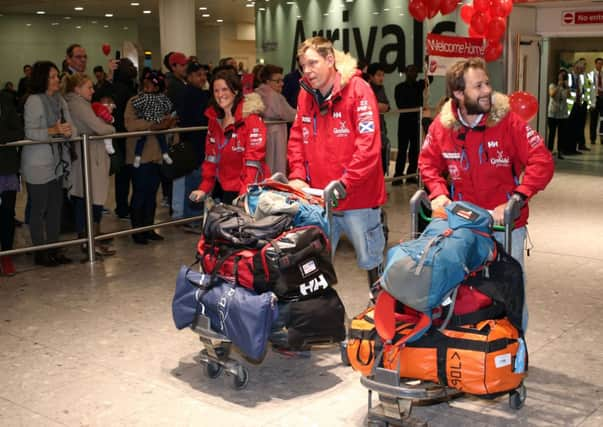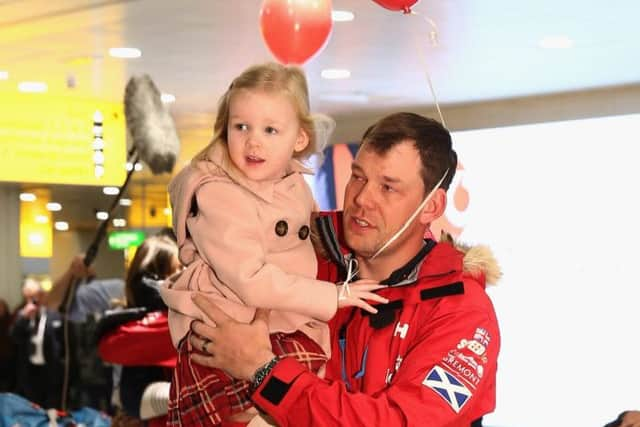Scots double amputee returns from South Pole trek


Sergeant Duncan Slater was reunited with his wife and daughter after six weeks trudging 200 miles through minus 45C temperatures in the company of Prince Harry.
He and the other injured British service personnel who formed the Walking With The Wounded Charity expedition returned home to a heroes’ welcome after an adventure Sgt Slater described as “crazy”.
Advertisement
Hide AdAdvertisement
Hide AdThe former RAF Regiment Gunner was crippled after the vehicle he was travelling in was hit by an improvised explosive device (IED) in the Babaji area of Afghanistan in July 2009.


Yet he recovered enough to trudge across punishing terrain and freezing temperature using custom-made prosthetics.
Yesterday Sgt Slater, who is originally from Muir of Ord, near Inverness, said: “It was pretty crazy – you couldn’t have written it.”
Holding his young daughter, Lilly, he added: “I’m just happy to be home to this little one.”
The injured British service personnel who formed the Walking With The Wounded charity expedition arrived at Heathrow after catching a flight from Cape Town to spend Christmas at home.
They faced such extreme weather conditions during their 200-mile odyssey that organisers had to call off the competitive element of the adventure.
Working as one unit, the UK team and squads from the US and Commonwealth made it to their Antarctic goal together on Friday, 13 December. In total, 12 injured servicemen and women who have overcome life-changing injuries took part, with Prince Harry serving as team UK’s patron.
The terrain was made more difficult by “sastrugi” – which are sharp, irregular ridges eroded into the ice by the previous Antarctic winter. The sastrugi were three feet high, the worst that had been seen in a number of years. As Sgt Slater said yesterday: “It was a big disappointment when the race was called off but some of the guys were really struggling, some had frostbite, so I can see why they did it.”
Advertisement
Hide AdAdvertisement
Hide AdEarlier in the expedition, Prince Harry paid tribute to Sgt Slater, who during the final stage of the three-week journey guided Ian Castro, a blind member of the American team.
“It is just remarkable that someone with no legs had made it here, and to have done it in record-breaking time, no doubt,” he said.
Aiming to trek between nine and 12 miles a day, the teams endured temperatures as low as minus 45C and 50mph winds as they pulled their 154lb sleds.
Prince Harry had previously taken part in a Walking With The Wounded expedition to the North Pole in 2011. The team tackled a challenging training programme beforehand to prepare themselves for the conditions in Antarctica.
Yesterday, expedition director Ed Parker said: “It was far harder than we were expecting. We were expecting flat snow from south of 87 degrees to the Pole but there have been bad storms through the winter over there, so it was very broken up.
“Psychologically it’s hard, there’s nothing to see, it’s very, very flat, so your brain has nothing to focus on.”
Asked what the wounded soldiers gained from the experience, he said: “I think for them it proves they can do just about anything.”
Among the other British participants was Major Kate Philip, 35, from Worcestershire, who lost her leg below the knee while serving in Afghanistan in November 2008.
The only female member of Team UK hailed Prince Harry, who returned to Britain separately, for being “fantastic from beginning to end”.
She added: “He was a really strong, fit individual.”